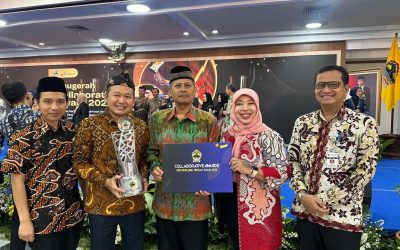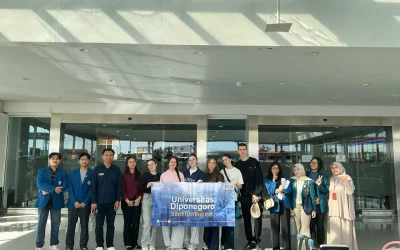Universitas Diponegoro conferred the title of Distinguished Professor upon three esteemed educators in a formal afternoon session on Thursday, September 7th, held at the Prof. Soedarto, S.H. Building in Undip Tembalang. The three distinguished professors who were honored are as follows: Prof. Dr. Ir. Munasik, M.Sc. (Faculty of Fisheries and Marine Sciences); Prof. Dr. Drs. Hardi Warsono, M.T. (Faculty of Social and Political Sciences); and Prof. Bagus Hario Setiadji, S.T, M.T., Ph.D. (Faculty of Engineering).
 Prof. Munasik delivered a speech entitled “Smart Ecological Design of Artificial Patch Reefs for the Restoration of Indonesia’s Coral Reef Ecosystem.” Indonesia boasts the world’s largest coral reef ecosystem, covering nearly one-fifth of the global coral reef area with the highest biodiversity. However, the health of this ecosystem has been deteriorating, with less than 10% of it currently in its best condition. Thus, coral reef restoration efforts are essential to prevent the extinction of this vital ecosystem.
Prof. Munasik delivered a speech entitled “Smart Ecological Design of Artificial Patch Reefs for the Restoration of Indonesia’s Coral Reef Ecosystem.” Indonesia boasts the world’s largest coral reef ecosystem, covering nearly one-fifth of the global coral reef area with the highest biodiversity. However, the health of this ecosystem has been deteriorating, with less than 10% of it currently in its best condition. Thus, coral reef restoration efforts are essential to prevent the extinction of this vital ecosystem.
“Smart Ecological Design of Artificial Patch Reefs (APR) offers a solution for coral reef ecosystem restoration, facilitating the creation of new habitats more rapidly and cost-effectively. As a result, it can contribute to sustainable development goals (SDGs), particularly in enhancing the environmental quality index and the marine health index of Indonesia,” he elucidated.
 Meanwhile, Prof. Hardi delivered a scholarly discourse titled “Collaborative Governance and Bureaucratic Reform in Regional Cooperation towards Golden Indonesia by 2045.” Administrative boundaries often do not align with functional delineations. Natural functions such as river basins, regional roads, and the spread of diseases, whether physical or social, frequently transcend administrative boundaries. Consequently, addressing issues solely within administrative jurisdictions is often ineffective, necessitating synergy through interregional cooperation.
Meanwhile, Prof. Hardi delivered a scholarly discourse titled “Collaborative Governance and Bureaucratic Reform in Regional Cooperation towards Golden Indonesia by 2045.” Administrative boundaries often do not align with functional delineations. Natural functions such as river basins, regional roads, and the spread of diseases, whether physical or social, frequently transcend administrative boundaries. Consequently, addressing issues solely within administrative jurisdictions is often ineffective, necessitating synergy through interregional cooperation.
“To realize Collaborative Bureaucratic Governance towards Golden Indonesia by 2045, continuous bureaucratic reform is required in the management of collaborations involving two or more autonomous regions. It can no longer be managed through rigid bureaucratic approaches but should be approached through networking and collaborative methods,” stated Prof. Hardi.
On the other hand, Prof. Bagus addressed the importance of road stability as an indicator of performance goals for infrastructure agencies. The level of road stability is not constant but fluctuates over the lifespan of road pavement.
“The involvement of technology during the identification, measurement, and data compilation of road functional conditions is highly recommended to prevent measurement errors and human errors, combined with enhanced evaluation methods to obtain more accurate results for road functional conditions,” he concluded. (LW/Richal-Humas).

Source: undip.ac.id





0 Comments